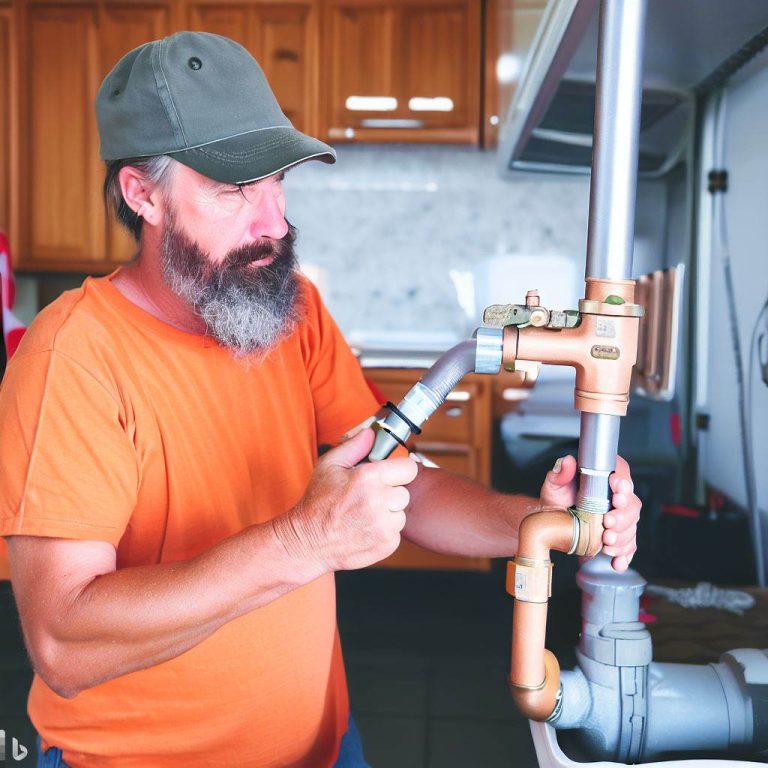
Mastering RV Plumbing: Tips and Tricks for Leaks and Clogs
RV life is a unique blend of adventure, freedom, and self-sufficiency. However, it also comes with its share of challenges, and one of the most common ones is dealing with plumbing issues like leaks and clogs. Whether you’re a seasoned RVer or just starting your journey, mastering RV plumbing is essential to ensure a smooth and enjoyable experience on the road. In this comprehensive guide, we’ll provide you with expert tips and tricks to tackle common RV plumbing problems and keep your water system in top shape.
Understanding Your RV Plumbing System
Before we dive into troubleshooting and prevention, let’s get familiar with the basic components of your RV plumbing system.
- Freshwater System: This is where your RV gets its clean water supply. It includes a water pump, water tank, and pipes that distribute water to faucets, showers, and toilets.
- Greywater System: Greywater consists of wastewater from sinks, showers, and appliances (except toilets). It’s stored in a separate tank and can be dumped at designated RV dump stations.
- Blackwater System: This is the most critical part of your RV plumbing, responsible for handling sewage from your toilet. It’s stored in a blackwater tank and requires careful maintenance.
Now, let’s explore some common RV plumbing problems and how to address them.
Dealing with Leaks
Leaky plumbing is an issue that can quickly turn a relaxing RV trip into a stressful situation. Here’s how to address and prevent leaks:
- Inspect Regularly: Regularly inspect your RV’s plumbing system for any visible leaks. Pay attention to pipe connections, faucets, and fixtures.
- Tighten Connections: If you spot a leak, check the connections first. Often, a loose fitting or a worn-out washer can be the culprit. Tighten any loose connections or replace damaged washers.
- Use Sealant: Invest in high-quality plumbing sealant and use it on all threaded connections. This prevents leaks and ensures a watertight seal.
- Inspect Water Heater: The water heater can be a common source of leaks. Check the relief valve, drain plug, and all connections for signs of leaks. Replace any faulty parts promptly.
- Maintain Flexible Hoses: RVs use flexible hoses for water connections, and these can develop leaks over time. Inspect them regularly and replace any that show signs of wear and tear.
Addressing Clogs
Clogs are another frustrating plumbing issue in RVs. Here’s how to deal with them:
- Prevent Clogs: The best way to deal with clogs is to prevent them in the first place. Use drain screens in sinks and showers to catch debris and hair. Avoid putting food scraps and grease down the kitchen sink.
- Use Biodegradable Toilet Paper: In the blackwater system, use RV-specific or biodegradable toilet paper to reduce the risk of clogs. Avoid using excessive amounts.
- Regular Tank Treatments: Use RV tank treatments to break down waste and prevent clogs in the blackwater tank. Follow the manufacturer’s instructions for dosage.
- Plunge Clogs: If you encounter a clogged drain, use a plunger to try and clear it. A plunger designed for sinks or toilets can be very effective.
- Chemical Treatments: If a clog persists, you can try a chemical drain cleaner specifically designed for RVs. Follow the instructions carefully and use these products sparingly.
Winterizing Your RV Plumbing
If you plan to store your RV during the winter or travel in cold weather, it’s crucial to winterize your plumbing system to prevent freezing and damage. Here’s a basic guide:
- Drain Water Systems: Completely drain the freshwater and greywater tanks. Ensure there’s no water left in the system.
- Blow Out Water Lines: Use an air compressor to blow out any remaining water from the plumbing lines. Start with the faucets and work your way through the entire system.
- Add Antifreeze: Pour RV-specific antifreeze into the drains, toilet, and blackwater tank to protect them from freezing. Follow the manufacturer’s recommendations for the correct amount.
- Seal Openings: Seal any exterior openings where cold air could enter the RV, such as vents and access panels.
- Protect the Water Heater: Drain and bypass the water heater, then wrap it with an insulation blanket designed for this purpose.
Tips for Freshwater Safety
Ensuring the safety of your freshwater supply is vital to your health on the road. Here are some tips:
- Use a Water Filter: Invest in a good-quality water filter to remove impurities and ensure your water is safe to drink.
- Sanitize Regularly: Regularly sanitize your freshwater system. This involves filling your tank with a sanitizing solution and running it through your plumbing to kill bacteria and germs.
- Check Hose Quality: Use a food-grade water hose to connect to external water sources. Regular garden hoses can contain chemicals that can contaminate your water.
- Monitor Tank Levels: Keep an eye on your freshwater tank levels to avoid running out while on the road. Consider installing a tank monitoring system for accuracy.
Mastering RV plumbing is essential for a smooth and enjoyable journey on the open road. By understanding your RV’s plumbing system, addressing leaks and clogs promptly, and taking preventive measures, you can avoid common plumbing issues and ensure a worry-free travel experience. Remember to winterize your plumbing system when needed, and always prioritize the safety and quality of your freshwater supply. With these tips and tricks in mind, you can focus on the joys of RV life while minimizing the hassles of plumbing problems.